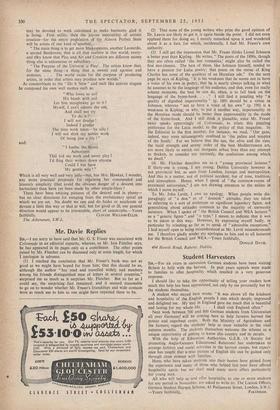The Vice of Work
SIR,—ln her disrespectful denigration of Work as expressed in her spirited essay, Mrs. Jacquetta Hawkes seems, surprisingly, to suggest that the Americans are less maniacally industrious than ourselves.
If that is indeed so, may it be that they owe their relative moderation to the warnings of their own essayist Don Marquis of nearly a generation ago, in his gaily subversive book The Almost Perfect State? Postulating that absolute perfection would soon prove unendurable, he casts about for an acceptable and manageable vice with which to temper his Utopia and proceeds:
" Would it not be strange if this vice which men have plumed themselves upon as a notable virtue should be the habit of overwork ? . . .
" For many years it was essential that the vast majority of men work long hours each day in order to exist. So long as it was necessary it really was a virtue. But it is no longer necessary; there is already in the world the mechanism which would, if properly employed, relieve the majorities of over-work. But they do not insist upon its employment because their mental habit is to regard overwork as a virtue instead of as the vice it is. . . . " But because men will cling to this vice of work it does not follow that it cannot be properly directed; in the Almost Perfect State,. after the short time each day has been put in at work that is necessary to keep humanity living, the remaining time may be devoted to work calculated to make humanity glad it is living. First utility, the the joyous superutility of artistic creation—for the ehtire po lation of the Almost Perfect State will be artists of one kind or nother, . . .
" The main thing is to get more Shakespeares, another Leonardo, a second Beethoven; that is all that matters in this world; every- and thy know that Play and Art and Creation are different names thing else is extraneous or subsidiary.. , .
" The Purpose of the Universe is Play'. Thp artists know that, for the same thing—a thing that is sweats and agonies and ecstasies. . . . The world exists for the purpose of producing artists, in order that artists may produce new worlds."
As counterblasts to the " Do it Now " and such like activist slogans he composed his own wall mottos such as:
" Who loves to soil His hands with toil Let him straightway go to it Myself, I can't admire the ant, And shall not try To do it !
I will not drudge ! Indeed 1 grudge
The time work takes—'tis silly !
I will not shirk my nobler work Of being just a lily !"
and:
" I loathe the moral Aphorisms That bid me work and never play I'd fling their writers down abysms Could I but have My gentle way !"
Which is all very well and very jolly—but, has Mrs. Hawkes, I wonder, any more practical proposals for regaining her commended and leisurely simplicity (that avoid the obvious danger of a descent into barbarism) than have yet been made by other simple-lifers ?
There have been enticing pictures of the desired end in plenty— but no clear directions for escaping from the evolutionary spiral on which we are set. No doubt we can and do brake or accelerate or deviate a little this way or that at will, but for good or ill, our general direction would appear to be irreversible, short of catastrophe.—Yours



































 Previous page
Previous page